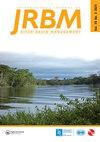评估越南湄公河三角洲河岸侵蚀的社会脆弱性
IF 1.9
Q3 WATER RESOURCES
International Journal of River Basin Management
Pub Date : 2021-12-29
DOI:10.1080/15715124.2021.2021926
引用次数: 2
摘要
摘要气候变化和包括越南湄公河三角洲在内的世界主要三角洲的跨界发展加剧了环境风险。地面沉降、河床采砂和密集的地下水开采都导致了河床水位下降,导致河岸侵蚀,当地居民的资产和生计损失。本研究调查了驱动因素,并对受越南湄公河两个主要支流河岸侵蚀影响的当地社区的社会脆弱性进行了分类。为了建立一个社会脆弱性指数,对洞塔省和安江省湄公河和巴萨克河沿岸218户受侵蚀影响的家庭进行了直接访谈。超过70%的受访家庭属于高度、中度或低脆弱性群体,这表明样本中有一系列受影响的社区,其中一些社区有能力应对其短期影响。然而,估计的社会脆弱性指数显示出显著的地理异质性,湄公河支流沿岸的社区比巴萨克河沿岸的社区更脆弱。我们的调查建议包括建立社区意识计划,以及确保和支持当地居民适应生计的政策变化。利益相关者的参与和加强社区参与被认为是帮助当地人民应对河岸侵蚀的复杂影响的最重要工具。本文章由计算机程序翻译,如有差异,请以英文原文为准。
Assessing social vulnerability to riverbank erosion across the Vietnamese Mekong Delta
ABSTRACT Climate change and trans-boundary development in the major deltas of the world, including the Vietnamese Mekong Delta have exacerbated environmental risks. Land subsidence, riverbed sand mining, and intensive groundwater extraction have all contributed to lower channel bed levels, resulting in riverbank erosion and the loss of assets and livelihoods for local residents. This study investigated the drivers, and classified the social vulnerability of local communities affected by riverbank erosion along two main branches in the Vietnamese Mekong. Direct interviews were conducted with 218 erosion-affected households along the Mekong and Bassac rivers in Dong Thap and An Giang provinces in order to create a social vulnerability index. More than 70% of the total surveyed households belonged to the highly, moderately, or low vulnerability groups, suggesting a range of affected communities within the sample, some of whom had the ability to cope with its short-term impacts. However, the estimated social vulnerability index revealed significant geographical heterogeneity, with communities along the Mekong branch being more vulnerable than those along the Bassac. The recommendations from our investigations include the establishment of community awareness programmes, as well as policy changes that ensure and support local residents’ livelihoods adaptation. Stakeholder participation and enhanced community engagement was found to be the most important tools available in terms of aiding local people cope with the complex impacts of riverbank erosion.
求助全文
通过发布文献求助,成功后即可免费获取论文全文。
去求助
来源期刊

International Journal of River Basin Management
WATER RESOURCES-
CiteScore
6.00
自引率
4.00%
发文量
48
期刊介绍:
include, but are not limited to new developments or applications in the following areas: AREAS OF INTEREST - integrated water resources management - watershed land use planning and management - spatial planning and management of floodplains - flood forecasting and flood risk management - drought forecasting and drought management - floodplain, river and estuarine restoration - climate change impact prediction and planning of remedial measures - management of mountain rivers - water quality management including non point source pollution - operation strategies for engineered river systems - maintenance strategies for river systems and for structures - project-affected-people and stakeholder participation - conservation of natural and cultural heritage
 求助内容:
求助内容: 应助结果提醒方式:
应助结果提醒方式:


